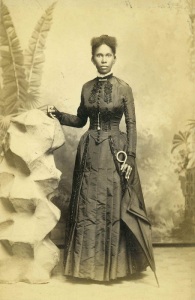During the 1860’s, Mathilda Taylor Beasley, a free woman of color, decided that helping others was more important than her personal safety. She opened the doors of her home to teach black children how to read and write. The punishment for operating a secret school was severe. However, the thought of being arrested, fined, or whipped did not deter her from spreading knowledge within her community.
Research also uncovered that she worked in a restaurant for Abraham Beasley, a free black businessman who allegedly gained portions of his wealth from the slave trade. To top off her working life, Ms. Beasley was also a seamstress. By these accounts, she was an educator, chef, and business woman.
We know that she stayed in Savannah during the war because she married Abraham Beasley in 1869. After her husband’s death in 1877, she donated all of her assets to found an orphanage and later became the first African-American nun in the state of Georgia (USA).
In 1988 a Georgia Historical Marker was erected for Mother Mathilda in Savannah, Georgia. In 2004, she was inducted in the Georgia Women of Achievement wall of fame. In 2005, Mother Mathilda was honored by the Georgia Heritage Celebration.
To portray Mother Mathilda would be a privilege indeed. So, many more questions come to mind for a Civil War Living Historian. What was life like for her in Savannah during the American Civil War? Did she sew uniforms for Confederate soldiers? Did any of her students become prominent leaders?
Much thought and consideration are going into my selection for a 19th Century Heroine. I knew that the decision would be hard; however, with such renowned women to choose from, the choice is near impossible.
Highlighting the good in humanity,
Ann DeWitt


You must be logged in to post a comment.